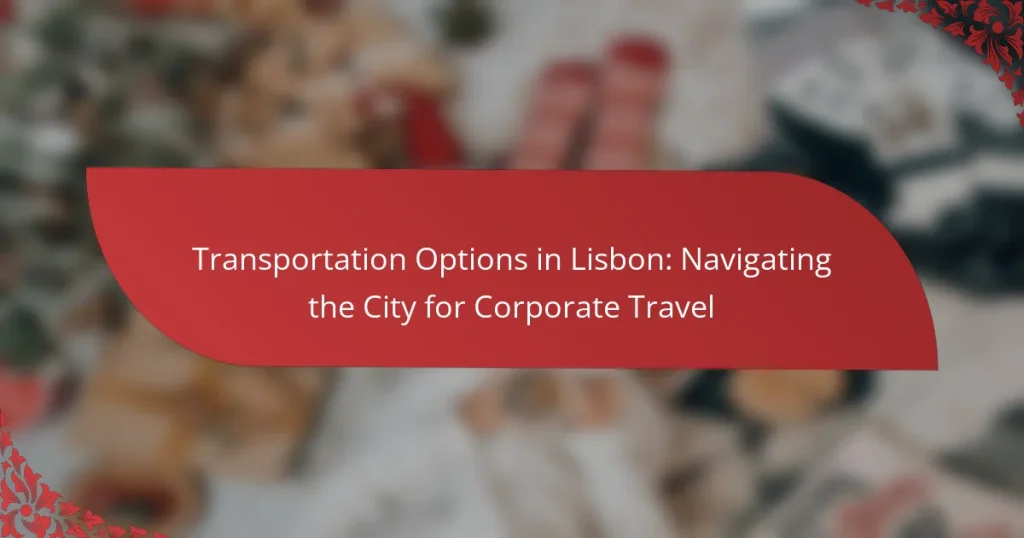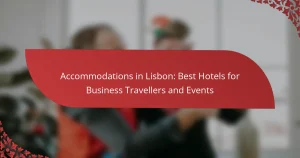Navigating Lisbon for corporate travel can be efficient and enjoyable with the right transportation options. Explore taxis and ridesharing for convenience, utilise public transit for cost efficiency, and consider unique experiences like tram rides and electric bike rentals. Address challenges such as traffic and parking while optimising your travel choices for meetings and events across the city.
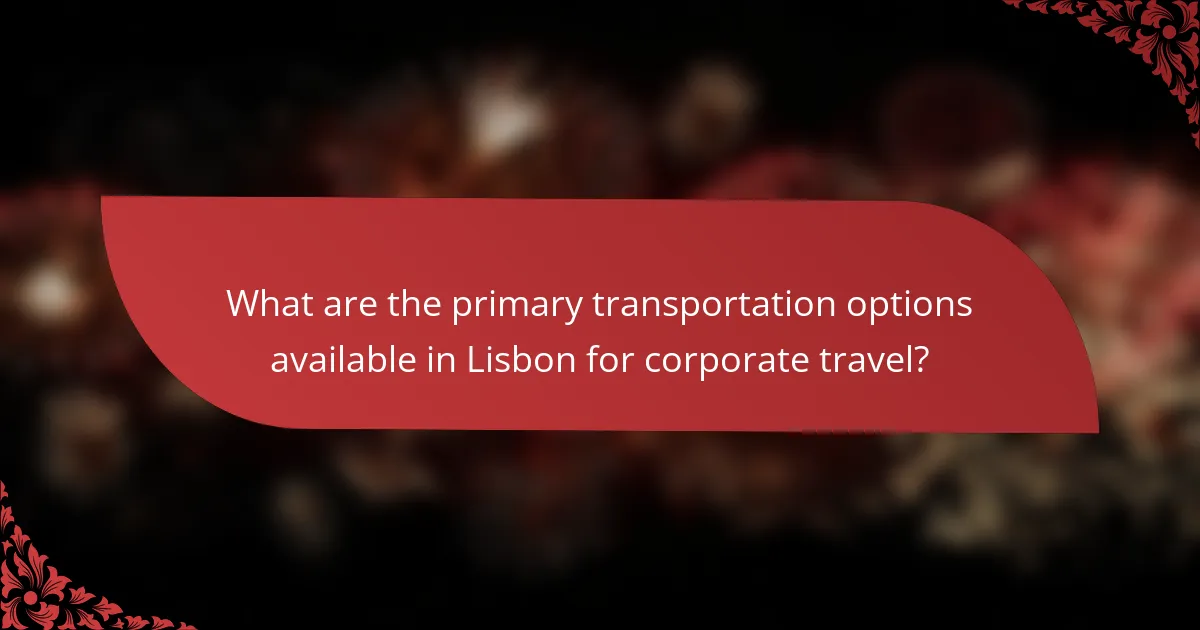
What are the primary transportation options available in Lisbon for corporate travel?
Lisbon offers various transportation options for corporate travel, including taxis, ridesharing services, public transit, and car rentals. Taxis provide convenient door-to-door service and are widely available. Ridesharing services like Uber are also popular, offering flexible pricing and ease of use. Public transit, including trams, buses, and metro, is efficient and cost-effective, connecting major business districts. Car rentals are available for those needing flexibility and independence during their travels. Each option has unique attributes to suit different corporate travel needs.
How do public transport systems like buses and trams operate in Lisbon?
Public transport systems in Lisbon, including buses and trams, operate efficiently with a comprehensive network. Buses serve various routes across the city, while trams provide scenic travel, especially on iconic lines like Tram 28. Both modes are integrated with a unified ticketing system, allowing seamless transfers. Buses and trams run frequently, ensuring accessibility for corporate travellers. The tram system features unique attributes, such as vintage vehicles that enhance the travel experience. Overall, Lisbon’s public transport is a reliable option for navigating the city.
What role do taxis and rideshare services play in navigating the city?
Taxis and rideshare services are essential for efficient navigation in Lisbon. They provide quick access to various corporate venues, reducing travel time significantly. Taxis offer a traditional option with fixed rates, while rideshare services like Uber provide flexible pricing based on demand. Both options enhance corporate travel by ensuring timely arrivals to meetings and events. The availability of these services contributes to a seamless transportation experience in the city.
How do private car services compare to other transportation methods in Lisbon?
Private car services offer convenience and comfort unmatched by other transportation methods in Lisbon. They provide door-to-door service, flexibility in scheduling, and a more personalised experience compared to public transport or taxis.
Public transport in Lisbon, including buses and trams, is economical but can be crowded and less reliable. Taxis are available but often face long wait times and surge pricing during peak hours. In contrast, private car services ensure a fixed rate and dedicated vehicles, enhancing the travel experience for corporate clients.
A comparison of key attributes highlights these differences:
| Attribute | Private Car Services | Public Transport | Taxis |
|———————-|———————-|———————–|————————|
| Comfort | High | Moderate | Moderate |
| Cost | Higher | Lower | Variable |
| Scheduling Flexibility| High | Low | Moderate |
| Reliability | High | Moderate | Variable |
| Personalised Service | Yes | No | No |
For corporate travel, the benefits of private car services often outweigh the costs, making them a preferred choice for many professionals in Lisbon.
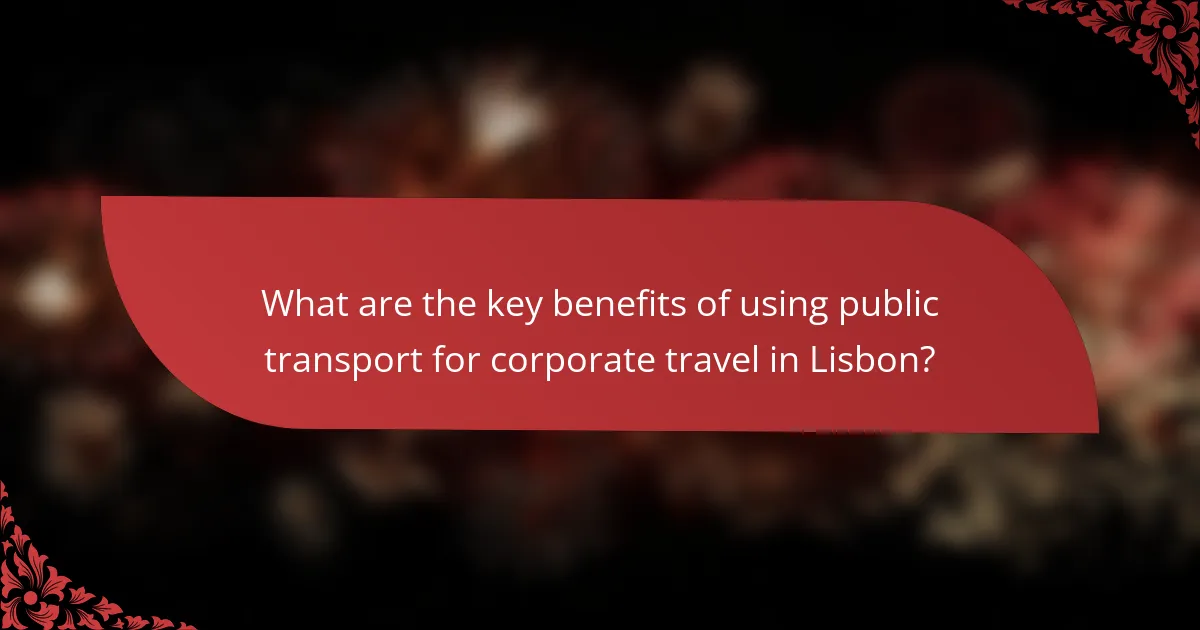
What are the key benefits of using public transport for corporate travel in Lisbon?
Using public transport for corporate travel in Lisbon offers cost efficiency, time savings, and environmental benefits. Public transport reduces travel expenses significantly compared to taxi services or car rentals. It also minimises the time spent in traffic, allowing for quicker access to meetings and events. Additionally, utilising public transport contributes to lower carbon emissions, promoting sustainable business practices. The extensive network of buses, trams, and metro services ensures comprehensive coverage across the city, enhancing accessibility for corporate travellers.
How does public transport contribute to cost efficiency for businesses?
Public transport significantly enhances cost efficiency for businesses by reducing travel expenses and increasing employee productivity. Utilising public transport lowers transportation costs, as companies can minimise fleet maintenance and fuel expenses. Furthermore, employees can spend travel time on productive tasks instead of driving.
In Lisbon, public transport options like trams, buses, and metro systems provide accessible and affordable travel solutions. Companies can leverage these options to lower overall operational costs while ensuring employees arrive at meetings and events punctually.
Additionally, public transport contributes to sustainability goals, which can improve a company’s public image and appeal to environmentally conscious clients. By adopting public transport, businesses can achieve cost efficiency while promoting a greener corporate culture.
What environmental advantages does using public transport offer?
Using public transport significantly reduces carbon emissions and traffic congestion. It promotes energy efficiency and encourages sustainable urban development. Public transport systems, like buses and trams in Lisbon, lower individual vehicle use, leading to improved air quality. As a result, cities experience enhanced livability and reduced environmental impact.
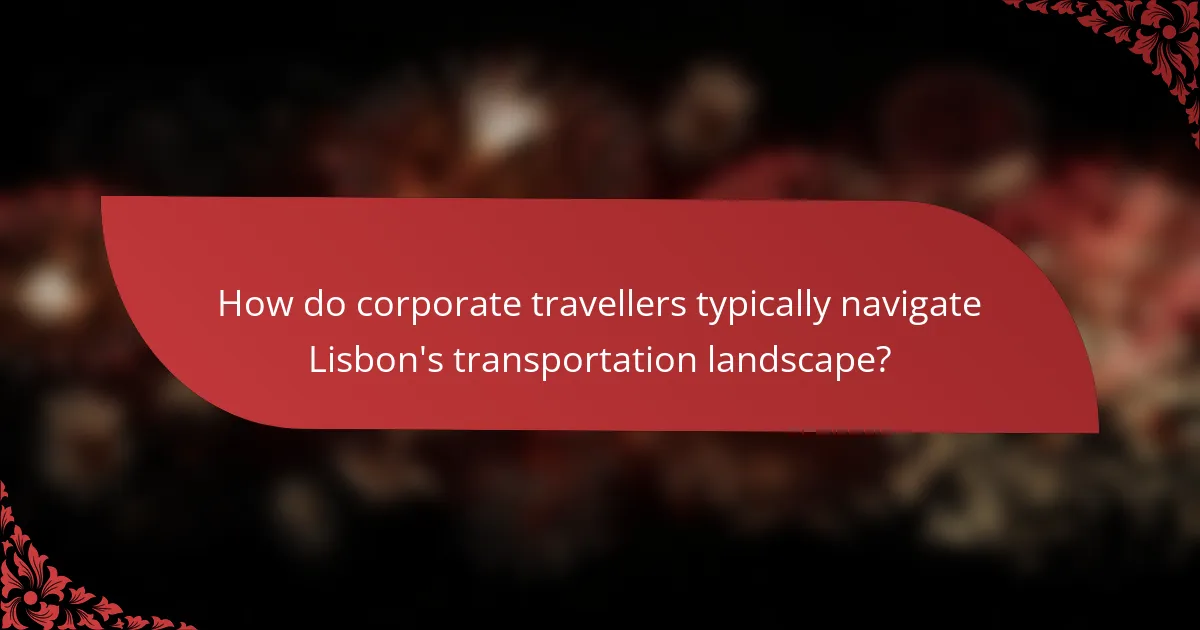
How do corporate travellers typically navigate Lisbon’s transportation landscape?
Corporate travellers in Lisbon typically navigate the city using a mix of public transport, taxis, and rideshare services. Public transport includes an extensive metro system, trams, and buses, which are efficient and cost-effective. Taxis are widely available and can be hailed on the street or booked via apps. Rideshare services like Uber provide convenience and flexibility. Additionally, walking is a viable option in the city centre due to its compact layout. Each mode of transportation offers unique benefits, allowing corporate travellers to choose based on their specific needs and schedules.
What are the most common routes and destinations for business trips in Lisbon?
The most common routes and destinations for business trips in Lisbon include the city centre, major corporate offices, and the airport. Corporate travellers frequently use public transportation options like the metro, trams, and taxis for efficient navigation. The Lisbon Metro is a popular choice due to its extensive network and affordability. Additionally, ride-sharing services are widely used for convenience. Key business districts such as Parque das Nações and Areeiro are often primary destinations for meetings and conferences.
Which apps or tools are most useful for corporate travellers in Lisbon?
Several apps and tools enhance corporate travel in Lisbon, focusing on transportation. Uber and Bolt provide reliable ride-hailing services. Google Maps offers navigation and public transit options. Lisbon’s public transport app allows access to metro, bus, and tram schedules. Citymapper integrates various transport modes for efficient routing. Finally, the Lisbon Travel app provides local insights and travel tips.
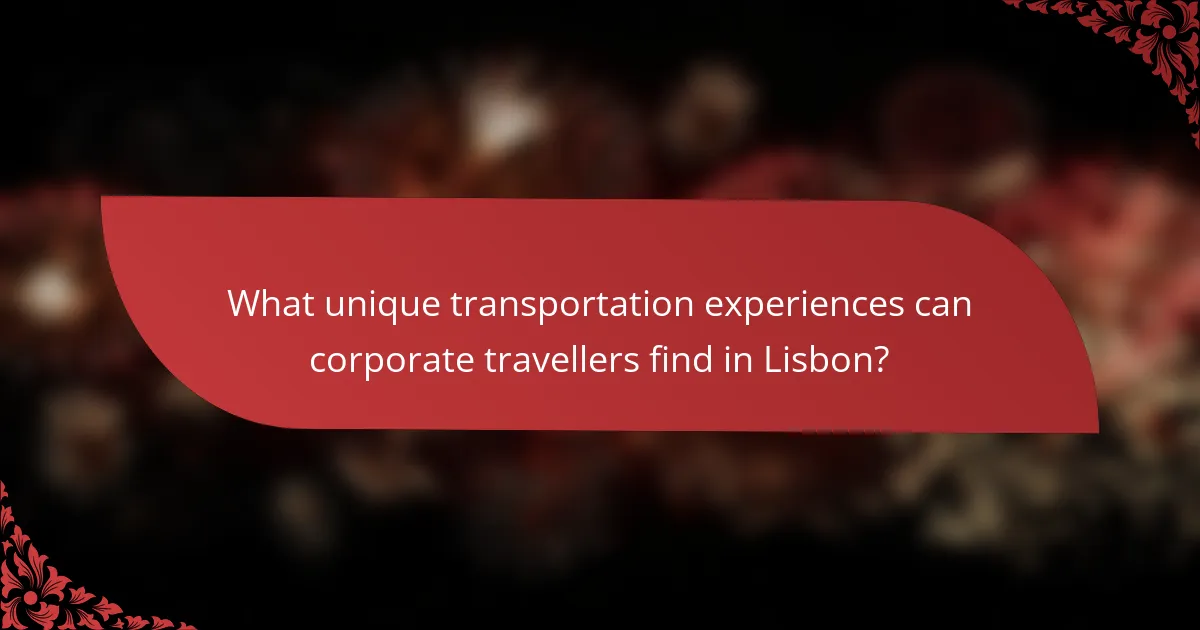
What unique transportation experiences can corporate travellers find in Lisbon?
Corporate travellers in Lisbon can explore unique transportation experiences such as tram rides, electric bike rentals, and private yacht charters. The iconic Tram 28 offers scenic routes through historic neighbourhoods, while electric bikes provide flexibility for navigating the city. For a luxurious touch, private yacht charters allow corporate travellers to enjoy the Tagus River and stunning views of the city skyline. These options enhance both convenience and enjoyment during business trips.
How does the historic tram system enhance the travel experience?
The historic tram system enhances the travel experience in Lisbon by providing a unique and scenic way to explore the city. Passengers can enjoy stunning views of iconic landmarks while navigating steep hills and narrow streets. The trams, particularly the famous Tram 28, offer an immersive glimpse into the city’s rich history and culture. This mode of transportation is not only practical but also a charming attraction that connects visitors to various neighbourhoods. Additionally, the vintage design of the trams adds to the overall aesthetic appeal, making travel through Lisbon an unforgettable experience.
What are the benefits of using Lisbon’s waterfront transport options?
Lisbon’s waterfront transport options provide efficiency, scenic views, and reduced travel times for corporate travellers. Utilising ferries, trams, and buses along the waterfront enhances accessibility to key business districts. These options allow for seamless connections between major hubs, promoting productivity. Additionally, the scenic routes offer a pleasant travel experience, which can positively impact the mood and energy of corporate travellers.
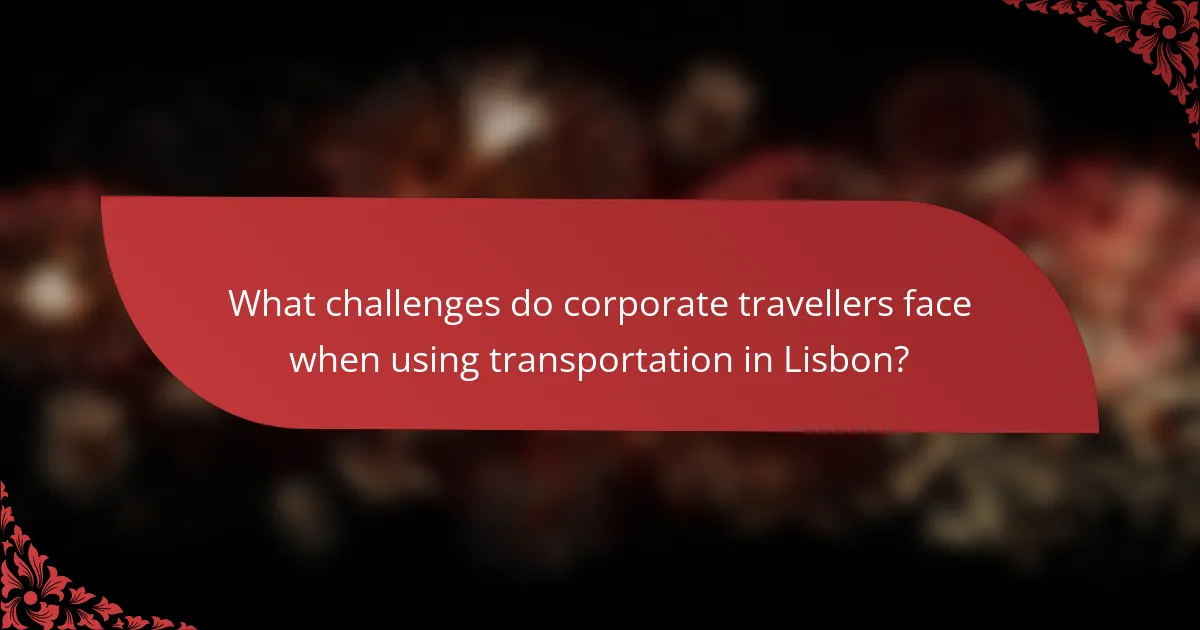
What challenges do corporate travellers face when using transportation in Lisbon?
Corporate travellers in Lisbon face various challenges, including traffic congestion, limited parking, and language barriers. Public transportation can be confusing, and ride-sharing services may have inconsistent availability. Additionally, navigating the city’s layout can be difficult for newcomers. These factors can hinder timely arrivals and overall travel efficiency.
How do traffic patterns affect travel times in the city?
Traffic patterns significantly influence travel times in Lisbon, especially during peak hours. Congestion can lead to delays, making it essential for corporate travellers to plan routes strategically. Public transport options, such as trams and buses, often have dedicated lanes, which can mitigate the impact of traffic. For instance, using the metro can provide faster transit during rush hours compared to driving. Understanding peak traffic times and alternative routes can enhance travel efficiency in the city.
What are common safety concerns for corporate travellers using public transport?
Common safety concerns for corporate travellers using public transport include theft, overcrowding, and lack of accessibility. Travellers may encounter pickpockets in crowded areas, especially during peak hours. Overcrowded vehicles can lead to uncomfortable situations and increased risk of accidents. Additionally, public transport might not always accommodate individuals with disabilities, limiting accessibility options. Awareness of surroundings and planning routes in advance can mitigate these risks.
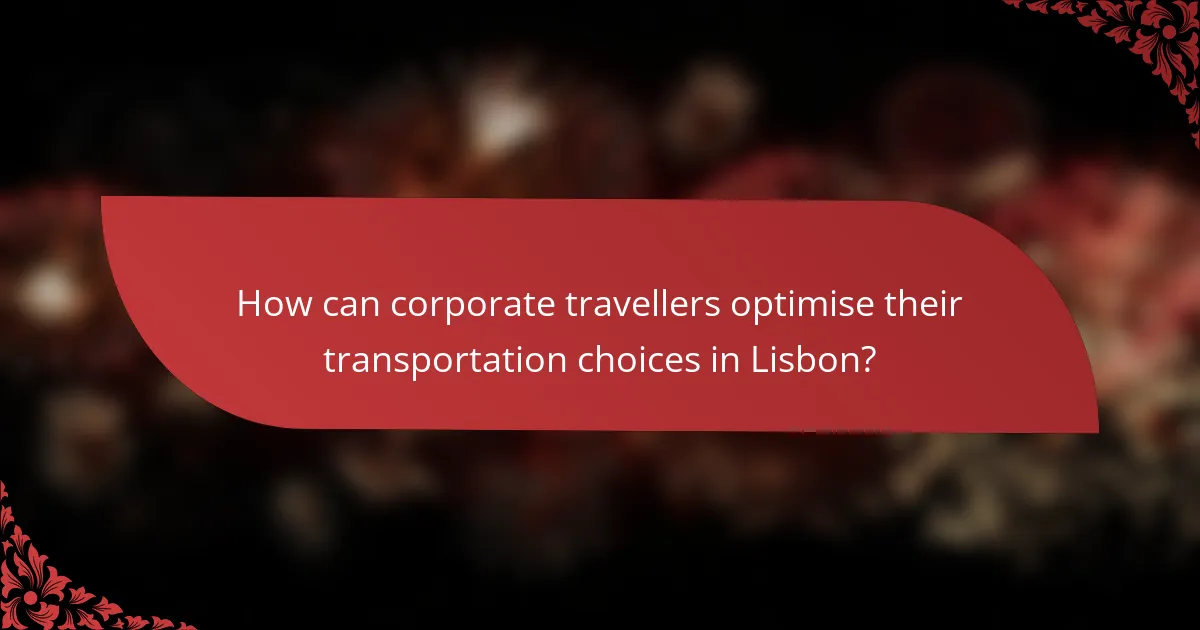
How can corporate travellers optimise their transportation choices in Lisbon?
Corporate travellers can optimise transportation choices in Lisbon by utilising a mix of public transit, ridesharing, and rental services. Public transport, including the metro and trams, offers efficient coverage across the city. Ridesharing services like Uber provide convenience for direct routes. Car rentals are beneficial for flexibility, especially for meetings outside central areas. Each option caters to different needs, balancing cost, time, and convenience.
What strategies can be employed to avoid peak travel times?
To avoid peak travel times in Lisbon, consider travelling during off-peak hours, utilising alternative transportation modes, and planning routes in advance.
1. Travel early in the morning or late in the evening to bypass rush hour.
2. Use public transportation, such as trams and buses, which may have less congestion than taxis.
3. Opt for bike rentals or walking for short distances, promoting both efficiency and health.
4. Monitor real-time traffic apps to adjust routes based on current conditions.
5. Schedule meetings or corporate events outside of typical working hours to minimise travel disruption.
What are the best practices for ensuring a smooth travel experience?
To ensure a smooth travel experience in Lisbon, consider these best practices for corporate travel.
1. Plan transportation in advance to avoid delays.
2. Utilise public transport options like trams and metro for efficiency.
3. Schedule airport transfers to minimise waiting time.
4. Familiarise yourself with local traffic patterns and peak hours.
5. Leverage ride-sharing services for convenience and flexibility.
What common mistakes should corporate travellers avoid when navigating Lisbon?
Corporate travellers should avoid common mistakes like relying solely on taxis, ignoring public transportation, and failing to plan for traffic. Using a mix of transportation options can enhance efficiency and reduce costs. Lisbon offers trams, buses, and metro services that are often faster and more economical than taxis. Additionally, travellers should familiarise themselves with local transportation schedules and routes to avoid delays. Not considering the walkability of neighbourhoods can also lead to missed opportunities for networking or sightseeing.
